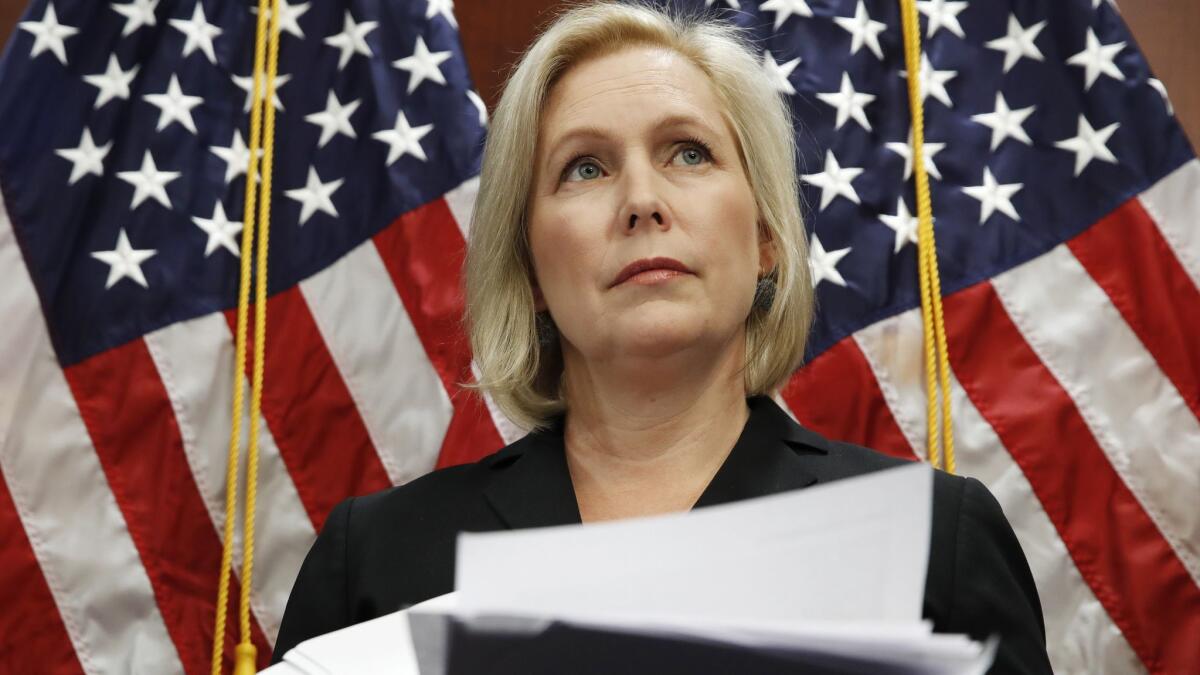Kirsten Gillibrand enters presidential race featuring a record number of women

Reporting from Washington â Sen. Kirsten Gillibrand (D-N.Y.), a central figure in the Democratic Partyâs debate about the #MeToo movement, is preparing to join a 2020 presidential primary contest that features a record number of women in the wake of the midterm election tidal wave of female candidates.
Gillibrand, 52, announced the formation of a presidential exploratory committee on âThe Late Show With Stephen Colbert,â which was taped Tuesday afternoon, in advance of a weekend trip to Iowa, where the first 2020 Democratic contest will be held.
âIâm going to run for president of the United States because as a young mom I am going to fight for other peopleâs kids as hard as I would fight for my own,â she said.
She will join a rapidly growing field that for the first time will offer Democrats a wide choice among female candidates. Hillary Clinton in 2016 faced an all-male Democratic field before she became the first woman to win a major party nomination. Disappointment over her upset loss to Donald Trump and continuing debate over why she failed is already shadowing the efforts of women who now follow.
The 2020 lineup already includes Sen. Elizabeth Warren of Massachusetts and Rep. Tulsi Gabbard of Hawaii, who were among the first to take formal steps to enter the race. Sen. Kamala Harris of California has just completed a book tour and is expected to make a formal announcement this month. Sen. Amy Klobuchar of Minnesota is also considering a run and said in a television interview Tuesday that her family supported the idea of her running.
The only time more than one Democratic woman ran in the presidential primaries was in 1972, according to the Center for American Women and Politics at Rutgers University. That year, Reps. Shirley Chisholm of New York and Patsy Mink of Hawaii both ran, although, unlike this year, neither was considered among the top tier of candidates.
Gillibrand is expected to open her campaign headquarters in Troy, N.Y., a city near Albany that was part of her congressional district when she served in the House from 2007 to 2009.
On Wednesday, she plans to follow her Colbert interview with a family brunch and news conference at a diner in Troy. Her trip to Iowa will be her first visit to the early voting state at least since 2016, according to Iowa Starting Line, a nonpartisan website that keeps track of political visits to the state. She is scheduled to hold public events Friday in Sioux City and Sunday in Cedar Rapids, with other stops across the state in between.
The trip will invite comparisons to Warrenâs, whose inaugural barnstorming tour in Iowa two weeks ago drew hundreds of cheering supporters at each stop.
Gillibrand was appointed to the Senate in 2009 after Clinton left to become secretary of State in the Obama administration. In the Senate, she has staked out a more liberal profile than she had in the House, when she represented a district that is more Republican and rural than the state as a whole and took more conservative positions on immigration and gun rights, among other issues.
In the Senate, she has been an advocate for gay rights, helping push for repeal of the militaryâs âdonât ask, donât tellâ policy. She spearheaded legislation combating sexual assault in the military. Her political action committee, called Off the Sidelines, focuses on helping female candidates, and she raised $7.1 million for them in the 2018 midterms.
Among 2020 candidates, Gillibrand is likely to lean the hardest into her record as an advocate for women.
Background documents released by her campaign staff underscored the importance of women â as voters and candidates â in Democratsâ big midterm election gains in 2018.
âThe lesson of 2018 is that the future of the Democratic Party is with women,â the document said. âWomen made up 58% of Democratic presidential primary voters in 2016 and will decide who Democrats nominate in 2020 to take on Donald Trump.â
Her record on issues of particular concern to women, however, has not been without controversy within the Democratic Party. In 2017, in the early, stormy days of the #MeToo movement, she was the first senator to call for Democratic Sen. Al Franken of Minnesota to resign after multiple accounts of sexual misconduct.
Gillibrand was applauded by many women, but other Democrats allied with Franken viewed her statements as a rush to judgment and hold a grudge against her for leading the charge.
Also in 2017, Gillibrand stirred an uncomfortable debate among women and many fellow Democrats by saying in an interview that President Clinton should have stepped down after his relationship with White House intern Monica Lewinsky was revealed. Her remark came at a time Republicans were grappling with sexual assault allegations against Alabama Senate candidate Roy Moore as well as long-standing allegations about Trump.
Many Clinton loyalists viewed Gillibrandâs comments as a betrayal.
Philippe Reines, a top aide to Hillary Clinton, upbraided Gillibrand on Twitter. âOver 20 yrs you took the Clintonsâ endorsements, money, and seat. Hypocrite,â he wrote on Twitter. âInteresting strategy for 2020 primaries. Best of luck.â
Gillibrand has been a leading Trump critic and endeared herself to the anti-Trump resistance by being the Senate Democrat who voted most consistently against the presidentâs nominees. She was the only senator to vote against James N. Mattisâ nomination to be Defense secretary, which was approved 99 to 1.
Twitter: @hookjan
More to Read
Get the L.A. Times Politics newsletter
Deeply reported insights into legislation, politics and policy from Sacramento, Washington and beyond. In your inbox three times per week.
You may occasionally receive promotional content from the Los Angeles Times.











